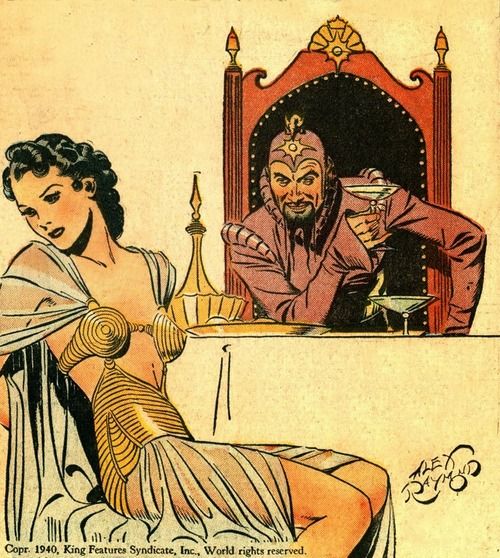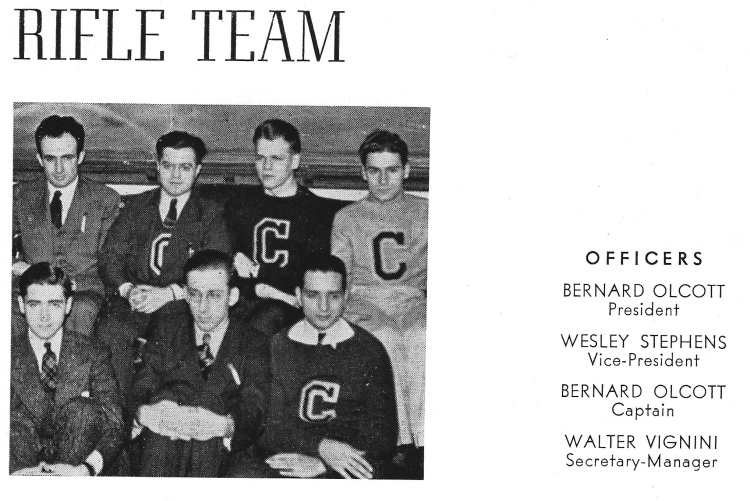Aside from World War II and the War of the Worlds broadcast, there were other haps in the 1930s and 1940s that informed my Dad’s interests and personality. For example, as he told me numerous times, his favorite comic strip of the era was Flash Gordon. Flash was big at the time. Dad loved Flash so much, it was even his college nickname!
As I reviewed the original comic strip in preparation for this post, I was struck by how much it resembles Star Wars of my generation. The action takes place on the planet Mongo, locale of kingdoms like Arboria (forests) and Frigia (ice). Kings and Queens galore! And the villain? A bad guy with interesting headwear!

Meet Ming the Merciless!
When looking at the above image of Ming, I am not sure if Darth Vader was ever so similar a lady killer. Well, the young Jedi Anakin certainly was, in the prequels. Unfortunately, he lost his man parts — GOP Presidential candidates please take note — on the lava planet (or moon, whichever) after losing the sword fight to Obi Wan.

On the other hand, what Flash didn’t have was the tiresome drama of Luke and Leia playing “who’s your daddy?” Who needs parents anyway? That’s right, you heard it asked here on the Bernard Olcott Story blog!
Just messing with ya! Course you need them! Otherwise you wouldn’t be reading this blog today on a spring afternoon.
So it’s clear that Ming went to Tatooine about 5 years before Star Wars Episode 1. He hung out at the local equivalent of The Stork Club there, the Mos Eisley Cantina. A one night stand with a local chick named Shmee and voila! Star Wars is born!
Darth, if you want to understand yourself, you may want to consider getting your arms around your folks, mentally and spiritually. And if you arrive at a some level of understanding, then be sure to pick up and adopt the good bits.
You could try reading. There are a lot of Son/Father books out there. At some point in the future, I intend to post a review of my favorites about parenting. Patrick Kennedy just released a good one called “A Common Struggle.” While he does dish out a lot of anecdotes about his illustrious father and family, much of the book is a wonkish discussion of mental health legislation and policy.
Tim Russert wrote a very entertaining book called “Big Russ and Me: Father & Son: Lessons of Life,” about his Dad, a Buffalo sanitation worker. 90% less wonk and 85% more stories about the old man. Big Russ was always surprising his son who made good as an MSNBC political reporter.
And at the extreme other end of the spectrum, Niklas Frank wrote a dark book about his Dad called “In the Shadow of the Reich.” If you are a father, this is not the kind of book you want your son to write about you. But on the other hand, the elder Frank worked really, really hard at inspiring one. His resume includes such charms as Gauleiter of occupied central Poland in World War II, successfully instituting reigns of terror, and genocide implementations. Executed at Nuremburg in 1946. Buh bye!

Excellent books all, heavily recommended. And very different one from the other.
The 1930s and 1940s, to be sure, were full of menace. Dad, especially when I was small in the 1960s, would often perform dramatically and briefly, into the intro to a radio program called The Shadow. Which of course was unknown to me as I was blessedly born later into the television era. Still, it has that tinny patina of the war years, like the Orson Welles broadcast. “Who knows what evil lurks in the hearts of man! The Shadow Knows!!! Ha ha ha ha!”
Dad could perform a verbatim impersonation!
When not running around as the Flash, Dad’s main extra-curricular activity at Cooper Union was to serve as the President and Varsity Letterman of the Rifle Team:


According to the 1939 Cable Yearbook for Cooper Union, Dad campaigned for a new convenient riflery range as home for the team. Somehow the paperwork he submitted to the Student Council the summer before senior year was “lost” by September. However, “after some adjustments, the [Rifle] Team received money for a range.”


In addition to riflery, Dad was a great fencer. Between riflery and fencing, I was a witness to his skills as to the latter. He had fencing prints on the walls of his office in the Pan Am Building. Occasionally, he would take me to the New York Athletic Club to show off his lunge and parry.

Throughout the drone of comic book serials, radio dramas, Riflery competitions, fencing, fake war broadcasts, and real ones in the 1930s and 1940s, Dad attended to the serious business at hand culminating in a BS at Cooper Union, inclusive of the seminal QC/QA lesson.
On Graduation Day, June 8, 1939, degrees were conferred by President Gano Dunn who compared the Engineering degree with the Baccalaureate as a “molded anchor, stamped with the seal of Cooper Union.” “Not every anchor,” he added, “will withstand the test of severe storms.” The 1939 Yearbook concluded, “after many congratulations and introductions of instructors to families, the graduates left with a new determination to begin, and begin correctly, their new future work.”
How can some anchors not correctly withstand the test of a severe storm? Reminds me of a passage from Sebastian Junger’s book, “The Perfect Storm,” where he described the water of a stormy sea as “darkly marbled, like bad meat.”
As Dad left Cooper Union in 1939 as a Rifle Team President and graduate, there was plenty to do. First of all, there was a World War going on and any young man handy with a gun was in great demand. Dad did his initial service and training at Fort Dix and then had a great run as a Signal Corps Lieutenant, serving as a specialized electrical engineering consultant for military-related industry from Washington, DC to Boston, MA.
The first real storm was the sudden passing of his mother on August 22, 1943. This was presaged by the strange naval career of his brother Edward, serving as an officer in the US Navy from Manila to Casablanca, oddly returning to Queens just two weeks before.
It was uncanny timing to return home, as if he knew that death was coming to visit. And he moved heaven and earth within military command to come back just before. This will be the topic of my post next week.

My Uncle Edward Olcott and my paternal Grandmother Patricia Olcott (née Ragazinskas).

I love this, how well you write
It’s a real pleasure.
LikeLiked by 1 person
Thank you Patty. Coming from a real author, it’s a privilege having you here.
LikeLike
Only the Shadow knows!!!! My husband Would say that.
LikeLiked by 1 person
There was obviously something in the water back then!
LikeLike
This is incrediable for me to see. Your Dad always talked to me of his fencing. You describe him in a way, that makes his stories so real for me. Great job James! Rosemary
LikeLiked by 2 people